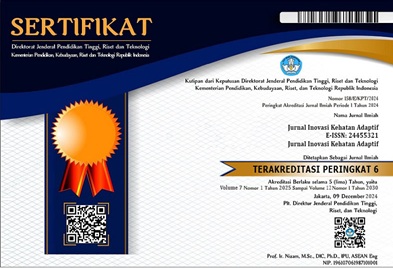LITERATURE REVIEW: PERESEPAN RASIONAL SECARA TOPIKAL PADA KELAINAN KULIT
Kata Kunci:
Efektivitas Terapi, Kelainan Kulit, Pengobatan Topikal, Peresepan NasionalAbstrak
Peresepan rasional merupakan suatu hal krusial dalam pengobatan topikal untuk kelainan kulit yang bertujuan memastikan penggunaan obat yang tepat, aman, efektif, dan hemat biaya. Peresepan rasional berfokus pada diagnosis yang akurat, pemilihan obat sesuai kebutuhan klinis pasien, serta pemberian dosis dan durasi terapi yang optimal. Namun praktik peresepan yang tidak rasional masih sering terjadi akibat kurangnya pengetahuan dokter, harapan pasien yang tidak realistis, serta praktik promosi yang tidak etis. Kondisi ini dapat memicu berbagai masalah, seperti resistensi mikroba akibat penggunaan antibiotik yang tidak tepat dan efek samping sistemik pada anak-anak dengan kulit yang lebih permeabel. Penyakit kulit di Indonesia menunjukkan prevalensi tinggi, baik infeksi maupun non-infeksi. Penyakit infeksi seperti tinea corporis dan skabies mendominasi penyebab utama, sementara dermatitis atopik dan dermatitis kontak menjadi penyakit non-infeksi yang umum. Pengobatan topikal memiliki peran penting dalam terapi dermatologi dengan mempertimbangkan preferensi pasien terhadap vehikulum, karakteristik penyakit, dan Target Product Profile (TPP). Penggunaan antibiotik topikal seperti mupirocin dan fusidic acid efektif untuk infeksi bakteri tertentu, sementara antifungal seperti azol dan allylamine digunakan untuk infeksi jamur. Retinoid digunakan untuk acne vulgaris, sedangkan kortikosteroid topikal menjadi pilihan utama untuk dermatitis. Praktik peresepan rasional membutuhkan perhatian pada interaksi obat farmakokinetik dan farmakodinamik untuk mencegah efek toksik atau kegagalan terapi. Selain itu, edukasi pasien tentang cara penggunaan obat yang benar serta dokumentasi peresepan yang baik sangat penting untuk meningkatkan efektivitas terapi dan mengurangi pemborosan biaya. Studi ini menyoroti pentingnya pendekatan berbasis bukti dalam peresepan rasional untuk meningkatkan prognosis pasien dengan kelainan kulit.
Rational prescribing is crucial in topical treatment for skin disorders, which aims to ensure the use of appropriate, safe, effective, and cost-effective drugs. Rational prescribing focuses on accurate diagnosis, drug selection according to the patient's clinical needs, and optimal dosage and duration of therapy. However, irrational prescribing practices often occur due to lack of doctor knowledge, unrealistic patient expectations, and unethical promotional practices. This condition can trigger various problems, such as microbial resistance due to inappropriate use of antibiotics and systemic side effects in children with more permeable skin. Skin diseases in Indonesia show a high prevalence, both infectious and non-infectious. Contagious diseases such as tinea corporis and scabies dominate the main causes, while atopic dermatitis and contact dermatitis are common non-infectious diseases. Topical treatment plays an important role in dermatological therapy by considering patient preferences for vehicles, disease characteristics, and the Target Product Profile (TPP). The use of topical antibiotics such as mupirocin and fusidic acid is effective for certain bacterial infections, while antifungals such as azoles and allylamines are used for fungal infections. Retinoids are used for acne vulgaris, while topical corticosteroids are the first choice for dermatitis. Rational prescribing practices require attention to pharmacokinetic and pharmacodynamic drug interactions to prevent toxic effects or therapeutic failure. In addition, patient education on how to use the drug correctly and good prescribing documentation are essential to improve therapeutic effectiveness and reduce cost waste. This study highlights the importance of an evidence-based approach in rational prescribing to improve the prognosis of patients with skin disorders.





